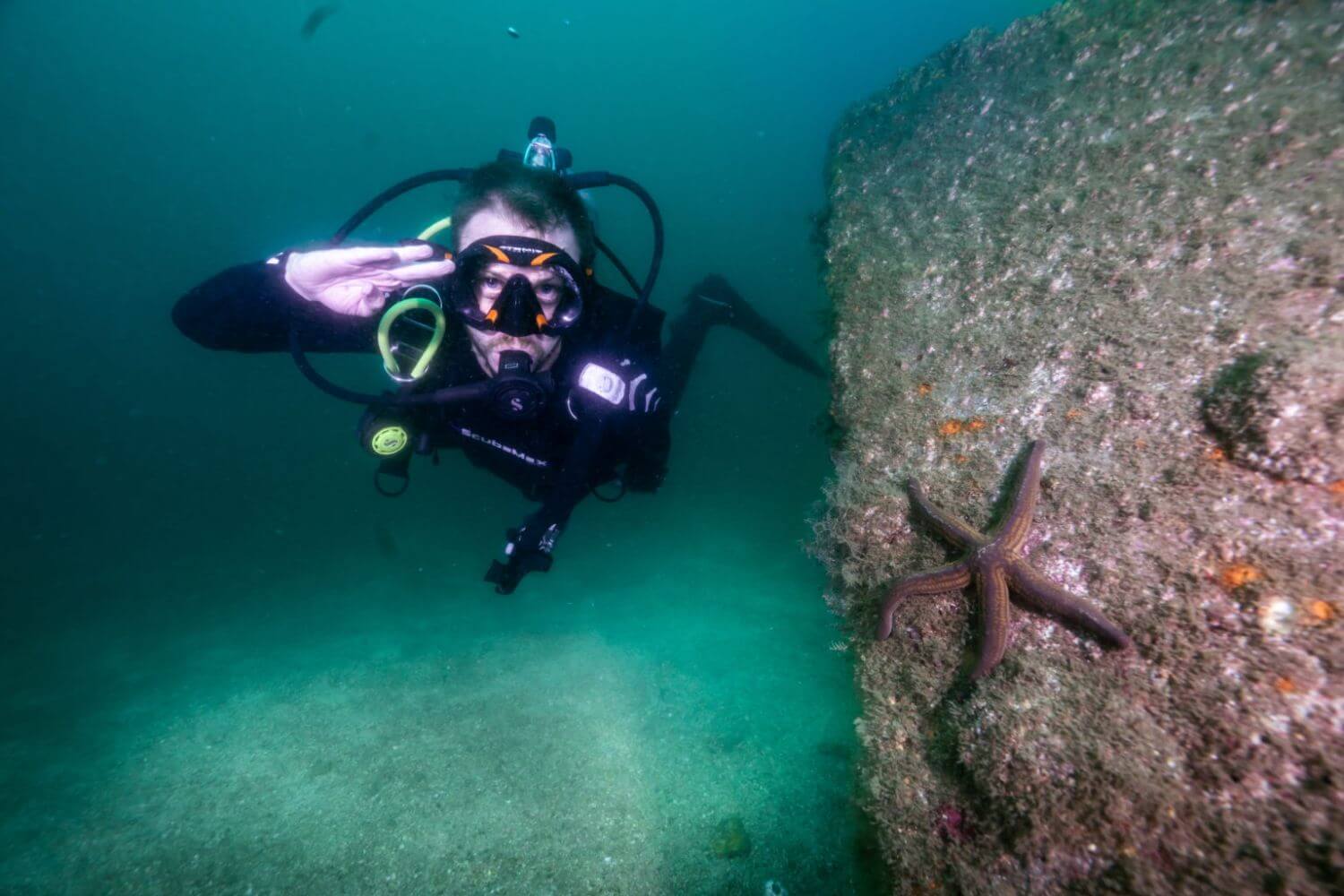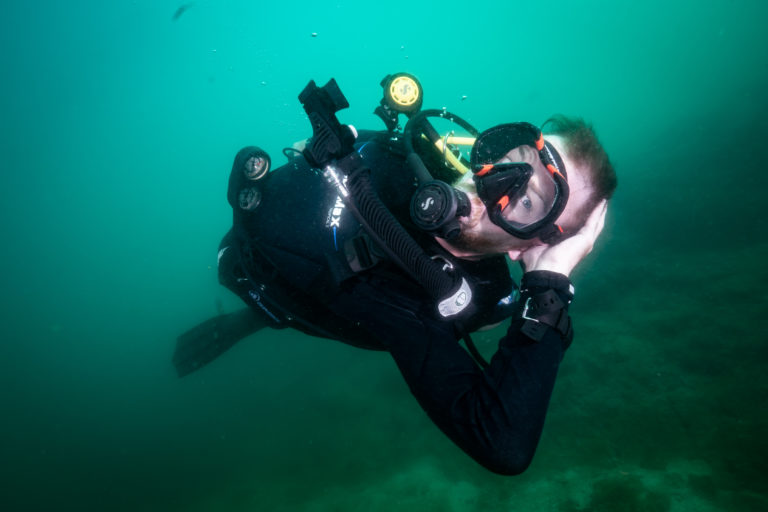
Back in 2014, I did my PADI open and advanced open water training in Koh Tao. Afterwards I always tried to incorporate scuba diving into my travels.
But it wasn’t until 2020 that I decided to do my Divemaster training and seriously pursue diving as a full-time career.
Of course being 2020, my plans were seriously scuppered by the global covid lockdowns which saw me stuck on a tiny beach less than 1km long in Puerto Galera.
After months of waiting as one of just two guests in a resort, I was finally able to get my divemaster certification!
Since then I’ve scuba dived around Costa Rica, Panama, Nicaragua, Ireland, the Red Sea, the Maldives, more Thailand and in 2023 I finally returned to the Philippines.
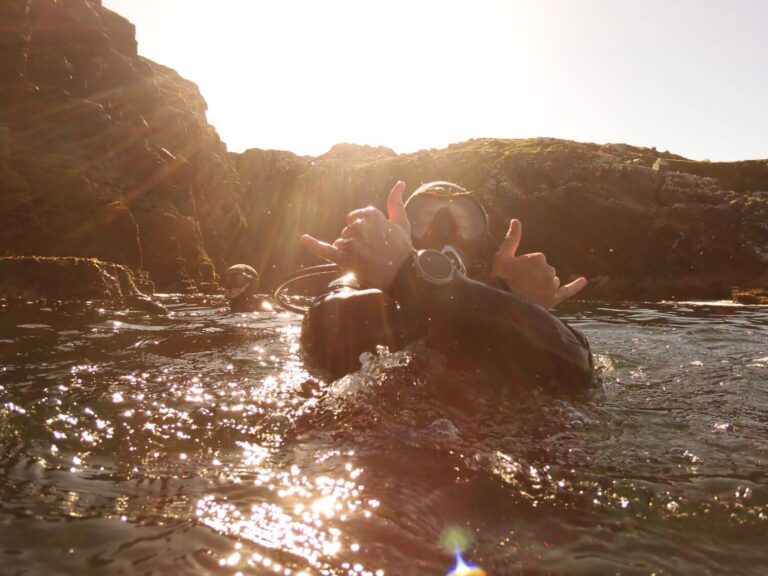
I’ve supported this lifestyle through the very website you’re on: Diving Squad; a monetized scuba diving blog in which I share my experiences of travelling the world as a freelance divemaster!
It’s been a hell of a journey and one I still consider myself to be at the start of. That said, I’ve already learned a helluva lot along the way!
Let’s dive in and take a look at 10 life lessons I’ve learned as a Freelance Divemaster:
1) Preparation is Key
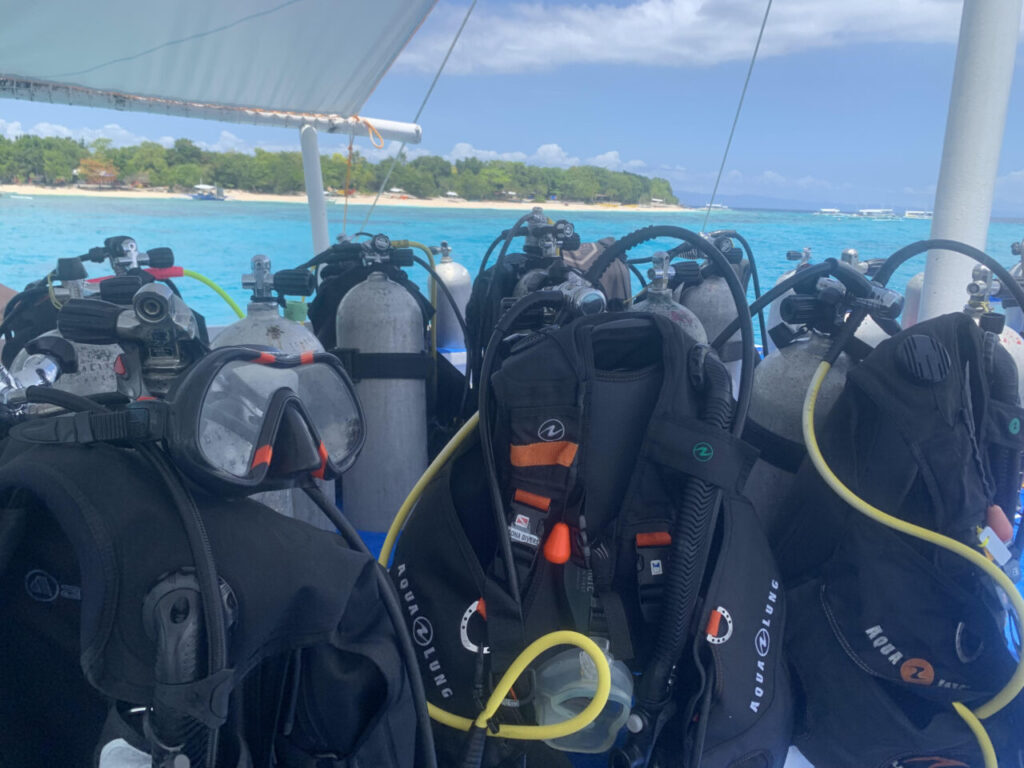
Before every dive you’ve gotta check the functionality and setup of the dive equipment being used by you and anyone else you’re guiding. This is crucial for making sure that everyone has a safe and enjoyable dive – you can’t cut any corners!
In my case, as well as checking dive gear, I also have to make sure that all of my camera equipment is fully charged, has plenty of storage space and is ready to go!
And when I’m travelling I need to pack all my dive gear, camera equipment, charging devices, computer, drone and standard travel items like clothing, meds and toiletries (so much fun carrying a 32KG suitcase up 12 flights of steps whilst also wearing a backpack!).
(Along with these essentials, it’s wise to include a light windbreaker jacket, especially useful for unpredictable weather conditions at sea or during travel to dive sites. Check out this article for some great options).
All this has taught me to be most thoroughly thorough, always allow more time than seems necessary and forever stay sharp. And yes, it’s totally carried over into other areas of my life: if there’s anything I need to prepare whether it be general travel, daily routine or lifestyle I prep for it as if my own and other’s lives depended on it – ooh’ rah!
2) Patience Young Padawan
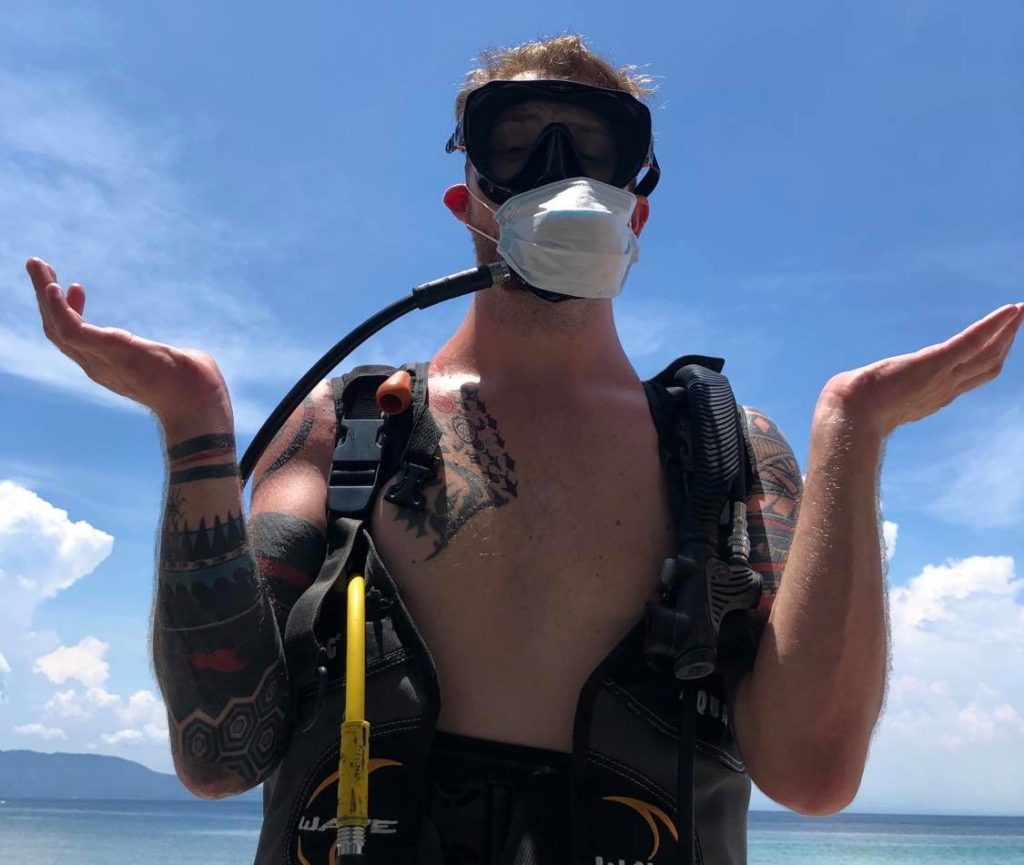
More often than not, the better a scuba diving destination is, the harder it be to reach!I’ve made long ferry-bus-ferry journeys to reach remote islands in Southeast Asia, driven the world’s most beaten up car across the border between Costa Rica and Nicaragua to dive with dolphins around the Corn Islands, frozen my balls of in an appallingly setup tent flapping precariously alongside Ireland’s Wild Atlantic Coast, spent a week living on a liveaboard cruising the Red Sea and the same again in the Maldives, I waited 3 months stranded in Puerto Galera before I could dive…
Even when you do reach fabled dive destinations, to get to their very best dive sites, you usually have to spent another day on a long boat ride to get there. All this has taught me to stay patient and enjoy the journey without over-fixating on the destination.
3) Make every breath count
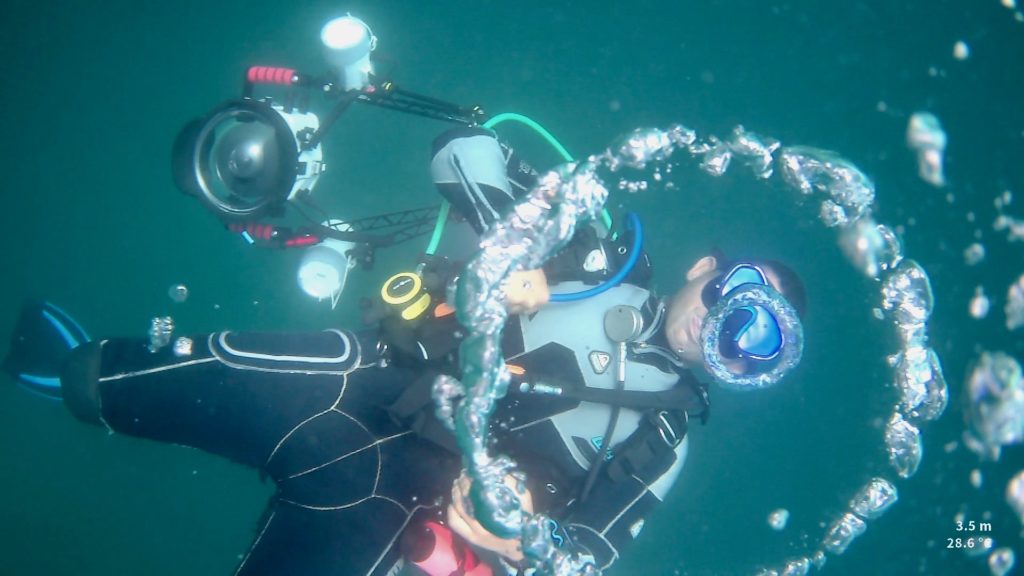
I’ll admit that when I first started scuba diving I was so blown away by the dreamlike sensation of being able to breathe underwater that I gluttonously gulped down gasp after splasp of air with little thought for making it last.
It was only as time passed and after finishing several dives with hardly any air left in my tank that I discovered the thrill of finishing a dive with more air in your tank than anyone else and the knowledge of how this can actually save yours and others lives if something goes wrong down there.
Now when I dive, I make a concentrated effort to breath as conservatively as possible, to slowly exhale and only inhale when I really need to, without quick or shallow breaths. At first, it’s not as comfortable but you’ll get used to it and it’s a much safer and more skilful style of diving.
And you don’t need to stop when you’re on land. Try to always breathe in a focussed, present and conscious way. It’ll slow things down, give you more time to react and generally help you chill the fuck out in any given situation.
4) Teamwork & Communication
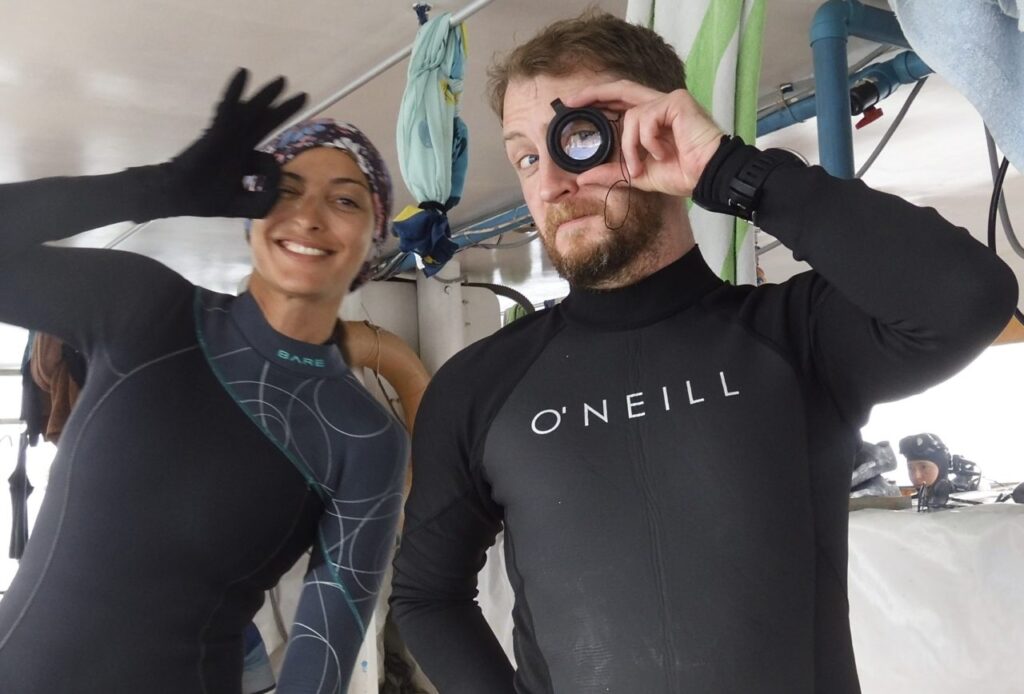
Recreational scuba diving is almost always done in a group and generally when someone is low on air or having difficulties; you all end the dive together.
This is a great way to hone the mentality of all for one and one for all; nobody get’s left behind, everyone looks out for one another. You also help eachother gear up, perform buddy checks and draw one another’s attention to cool things you see underwater.
Communication is also extremely important – you can’t talk underwater (believe me I’ve tried) so you have to use sign language. This teaches one the value of paying careful attention to others, reading their body language – and being sure to communicate things back slowly and clearly without saying more than is necassary.
5) When the going get’s Tough, take Inspiration from your Heroes
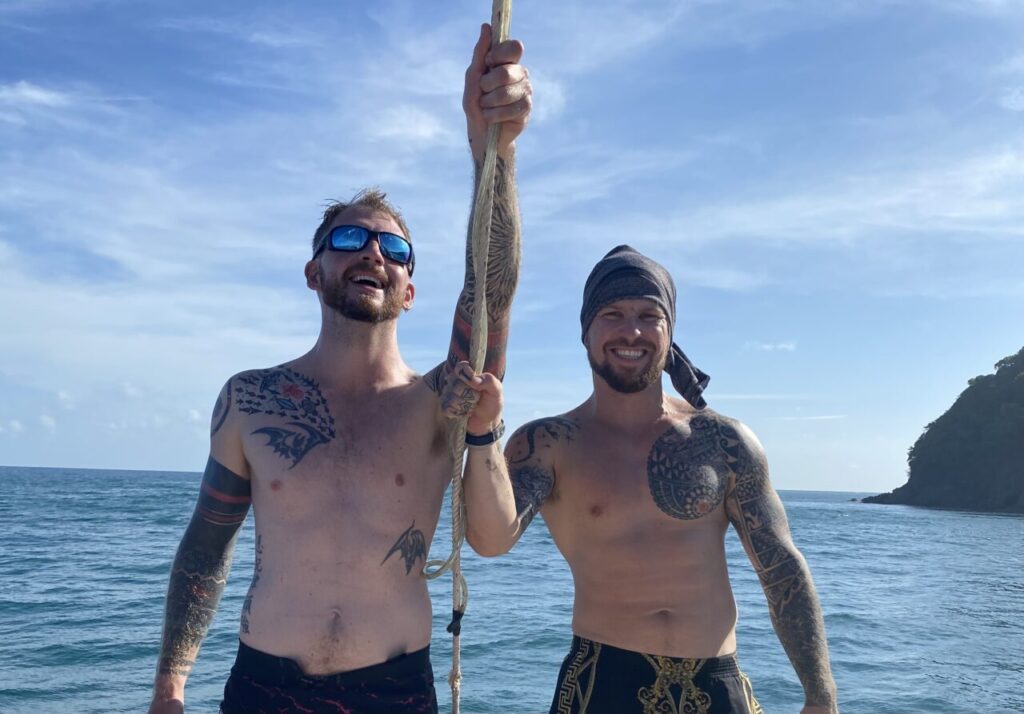
Since quitting my job as an Ecologist in 2018 to pursue a life as a scuba diving blogger, I’ve had many times where I’ve been extremely sick, almost financially broke, lonely from never being in the same place for more than a few months and generally unsure what the absolute fuck I’m doing with my life.
Don’t worry this is not from being a divemaster! Without a doubt, things would be far easier if I’d stayed on one place and worked for a dive centre but in my quest to witness as much of this world’s ocean as possible I’m forever on the move, a rootless leaf on the wind. (Whooooooshhhhh – leaf sfx).
Life kicks us all down from time to time; and the manner in which it does so is usually exceptionally unique and circumstantial to our lives.
Whenever I’m in a rut, I take heart from the writings, recordings and legends of my heroes; both to gain wisdom from how they deal with tough situations and be inspired by their incredible stories.
6) Shit can Change pretty Damn Fast
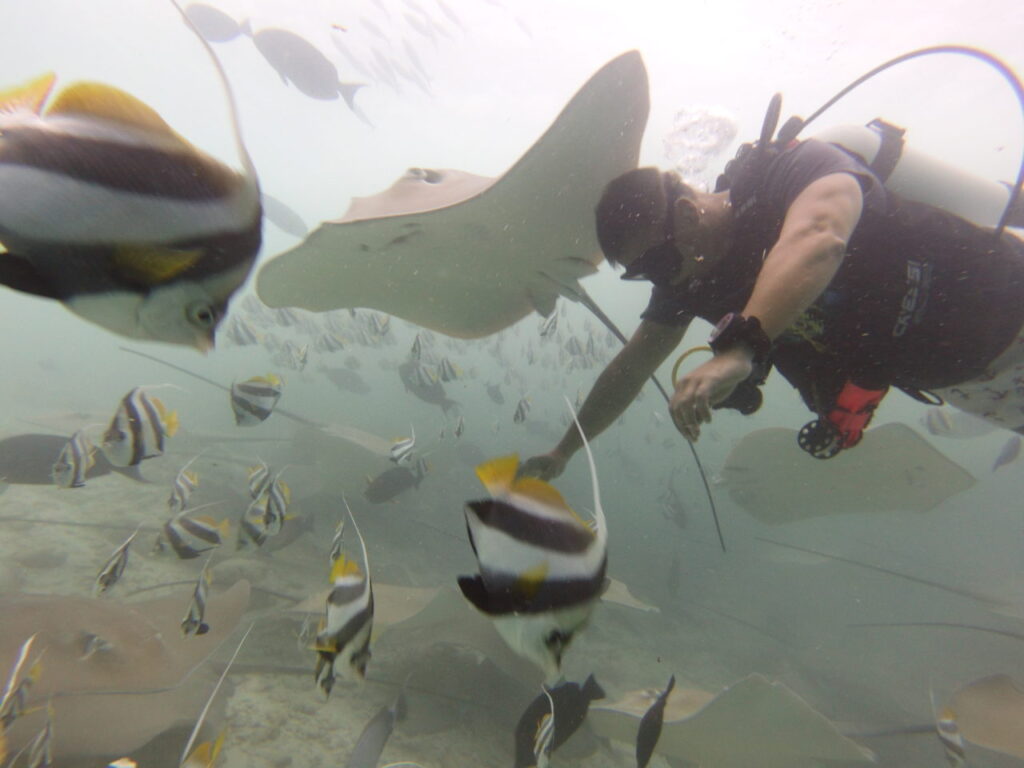
One moment you’re calmly floating through the ocean; a grain of pollen motionless on a still breeze, the next you’re driving your stick into the sand and hanging on for dear life as a huge current blasts debris, bewildered fish and perhaps even an unfortunate dive buddy past you.
Scuba diving teaches you that your entire surroundings and environment – whether literally or metaphorically can change in a heartbeat. That’s why you need to keep your wits about you, think quickly and act decisively yet not rashly.
I’ve honestly found one of the best ways to achieve all of this is to be focused, not over-think things and trust your gut (unless you have the shits).
7) People are awesome – and unique!
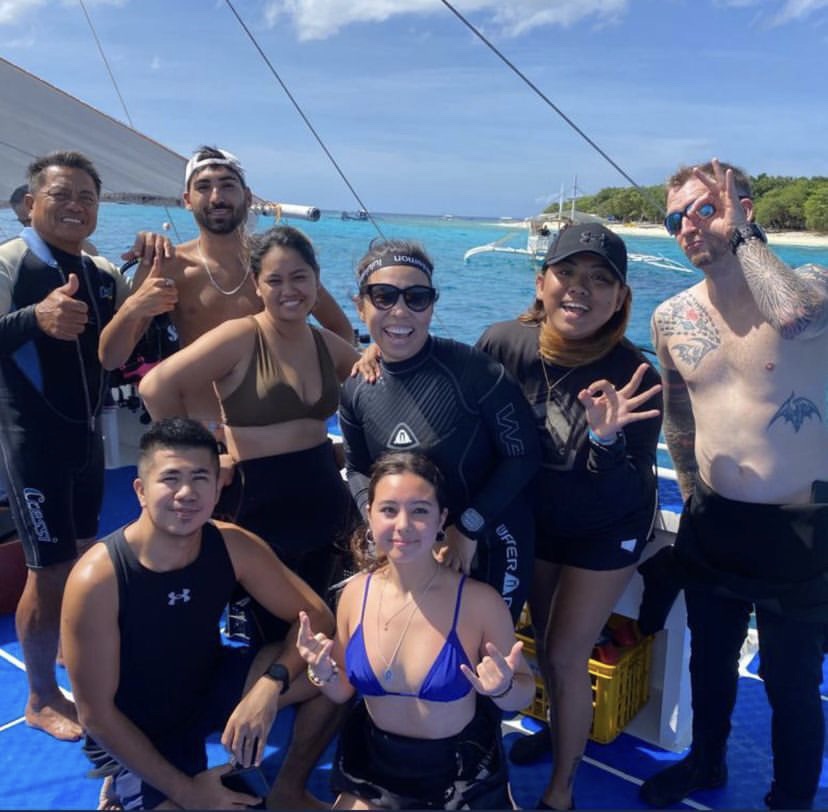
Before I talk about how much I love the underwater world, I want to mention another thing that massively appeals to me about scuba diving: the people!
Scuba divers are an awesomely unique, goofy and most quirky ragtag crowd; united by a passion for the ocean and an obsession for the sport. I have shared many, many many many post-dive beers with divers of all backgrounds, nationalities and ages; I’ve heard amazing tales, learnt incredible things and often been touched by how friendly and kind people are.
Sometimes whilst travelling, I have found myself in places that I don’t feel any connection to but I always know that if I can just get on a dive boat I will make friends and find my tribe.
8) The Underwater world is amazing – but it needs our help
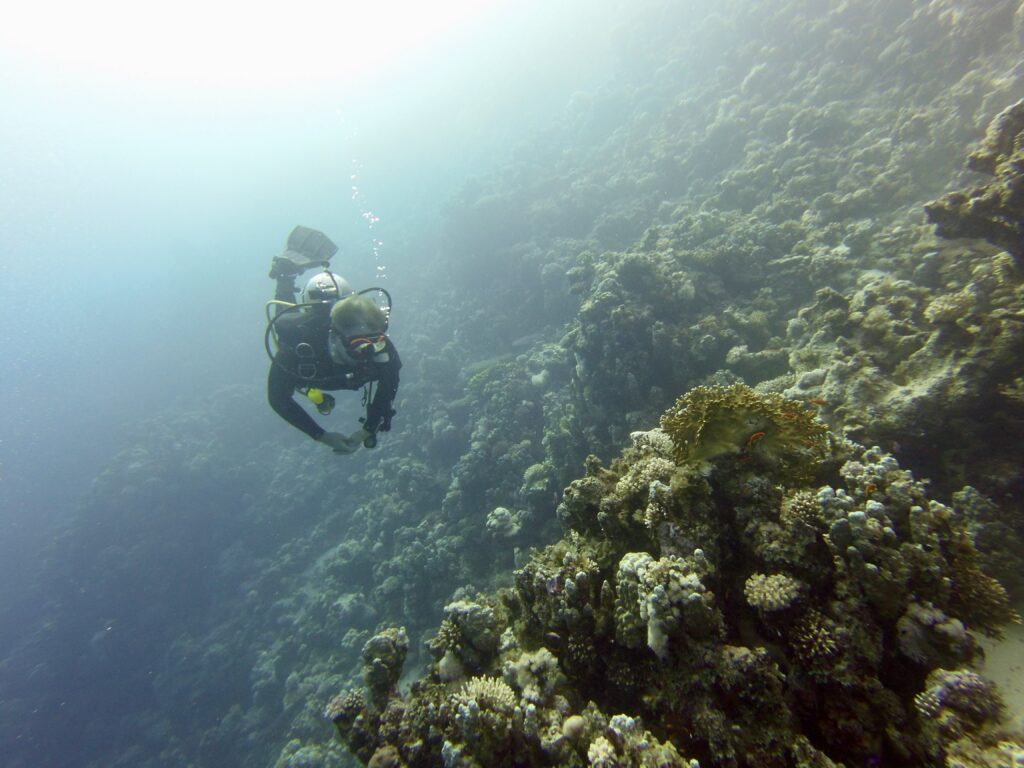
Scuba diving is like being teleported to an alien planet; one with an entirely alternative evolutionary timeline and in which the laws of physics, thought-processes and even time behave differently.
The underwater landscapes and the myriad of lifeforms that comprise and live among them are like something out of an LSD induced dream. The ocean is truly a majestic, awe-inspiring and incredible place.
Sadly though, it’s rare to go on a dive and not see some sign of the effect of human pressure on ocean environments; often in the form of damaged coral but also sometimes greatly reduced numbers of or even entirely absent larger marine life forms.
One moment you’re swimming alongside a spectacular wall of healthy coral the next you round a corner and find a lifeless grey graveyard of coral bones littered across the floor. Or perhaps you come face to face with an Oceanic Whitetip Shark and are awed by its grace and majesty – only to later learn that their numbers have fallen by 97.7% since the 1960’s.
In all parts of the world there are telltale signs of the extreme pressure man is exerting on the natural environment. As mighty hoomans it’s our responsibility to protect and restore it. Check out my heroes at Mission Blue for more info on this.
9) Don’t Miss the Little details
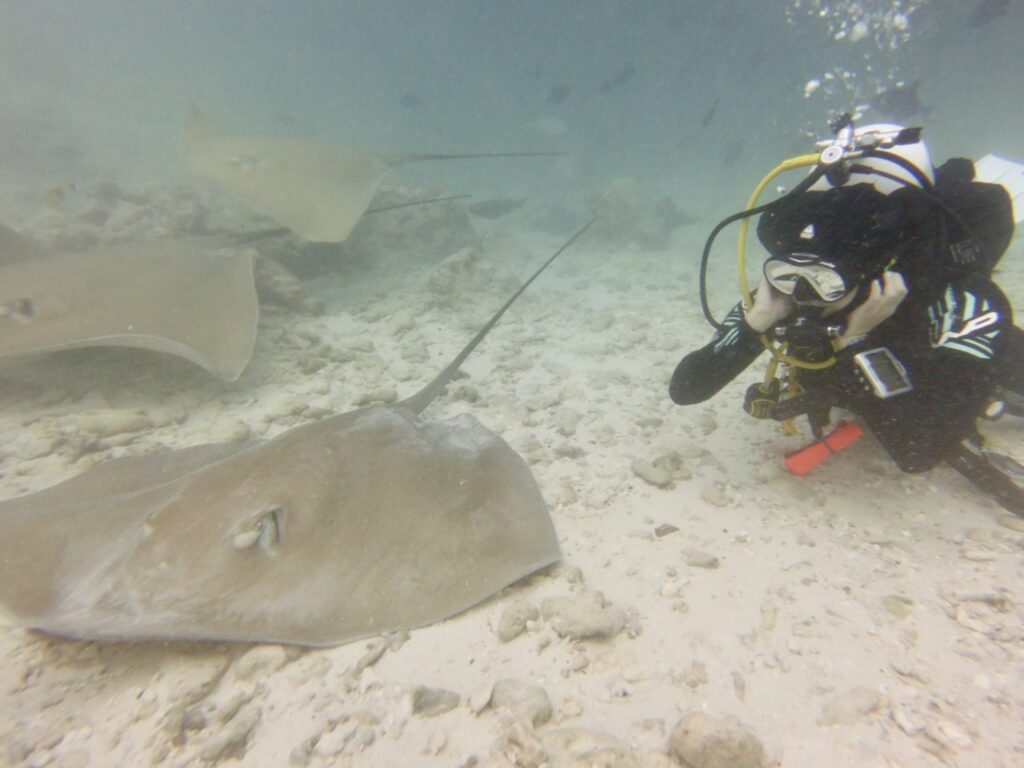
One moment you’re gaping in awe (and trying not to let your regulator fall out of your mouth) at a spectacular and endless stretch of reef before you, the next you realise there was a tiny seahorse less than a foot from your face the entire time.
Life is vast, epic and spectacular; full of grand experiences, mighty world’s and limitless possibilities So much so that it can be easy to forget to stop once in a while and look around at the more intricate, hidden details that make it all up.
10) But Don’t Forget to See the Bigger picture
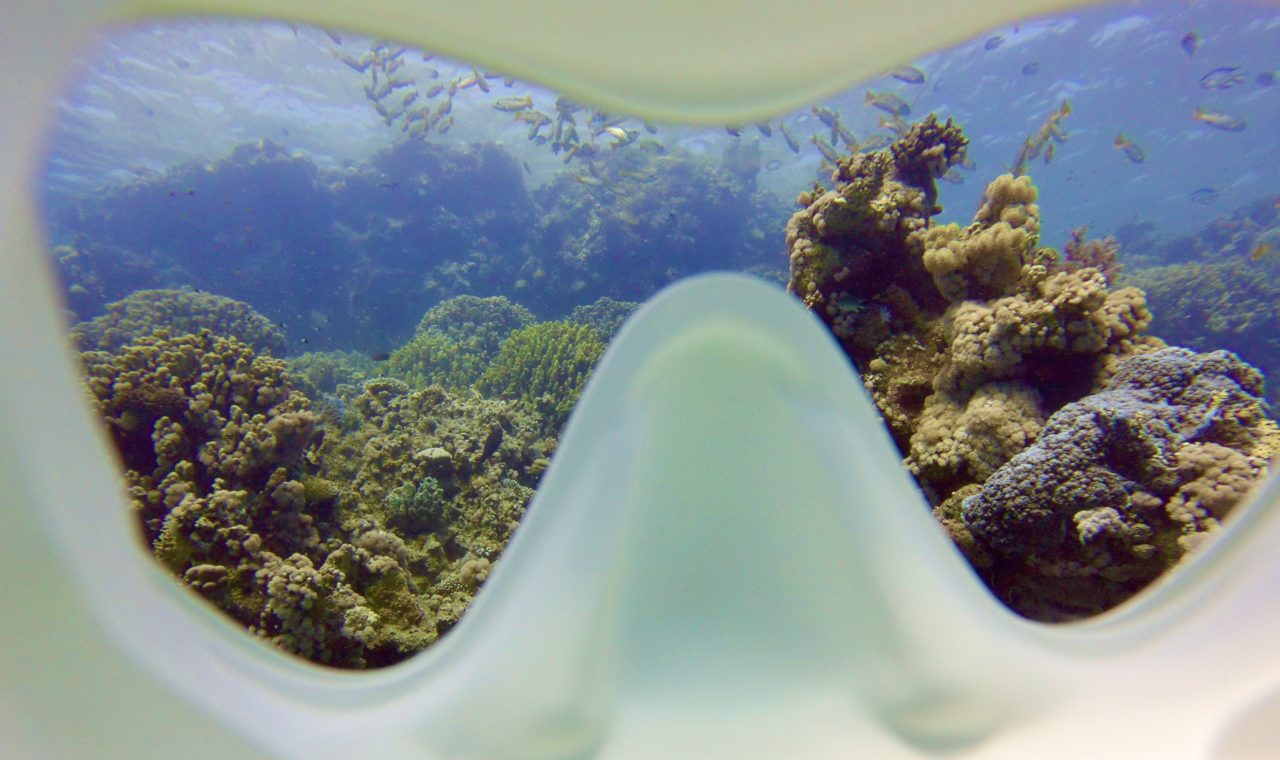
On the other end of the spectrum, there’s been times where I was staring so intensely at some tiny critter that I was totally surprised by some huge shark, ray or dolphin swooping into my view.
So whilst it’s really useful and important to take a closer look at things, don’t get so sucked into any one micro aspect of life that you completely take your eye off the bigger picture.
When shit seems bad – take a step back and realise all that there is to be grateful for and amazed by. When things are going good; don’t go on an ego trip; ask yourself why they are good – and how you can make them even better!
Diving Squad DEBRIEFING:
And that’s ten lessons I’ve learned over the last 3 years since I became a divemaster and continued to work on Diving Squad (which as of 2023, I’ve been working on for 5 years). I have no doubt that there are many more lessons upon the horizon and I look forward to sharing them with you.
Just before we finish this post allow me to share with you 5 useful tips for scuba diving travels of your own:
- Whenever you travel somewhere to scuba dive, think carefully about where you’ll stay. In many travel destinations, all of the scuba diving centres and resorts are concentrated within a single area; it really pays off to stay close by.
- Don’t get too sucked into GoPro’s! Look, underwater photography is great, it’s something I do a lot of to create content for this blog with. That said, I only use my camera for the unusual and extraordinary and am generally happiest on a dive when I’m not photographing and instead just being in the moment. These days I see so many divers with GoPro’s filming every last clownfish, moray eel, turtle, etc. I wander how many almost identical photos they must have and how much of the dive they’re experiencing with their own eyes and not through a lens.
- On that note – always put buoyancy and good diving technique before photography. It truly enrages me when I see a diver kicking over coral reef in an attempt to get close to something to photograph it. Perfect the basics first.
- Invest in your own scuba gear. You’ll be much more comfortable in your own dive gear and it will perform better. I’m not saying you have to fork out thousands of dollars and buy everything all at once. But having your own scuba mask ensures you’ll never have to use a cheap rental one that fogs whereas owning your own dive fins means you’ll have a comfortable fit and avoid foot cramps.
- Look out for your dive buddy – but don’t rely on them. Don’t scuba dive in a mindless manner with the assumption that someone will take care of you if things go wrong. Take responsibility for your own safety; whilst still being ready to help others in need.
And with that dear reader, we conclude this article! I hope you enjoyed the read. As I write this, I’m nearly 5 months into a trip around the Philippines; to finish the unfinished business I set out to do in 2020 of diving as much of this vast and mighty archipelagic nation as possible.
Next up…I’m going to be come a dive instructor, stop bloody moving around all the time and settle the fuck down for a while! I’ll tell you all about it as it unfolds.
